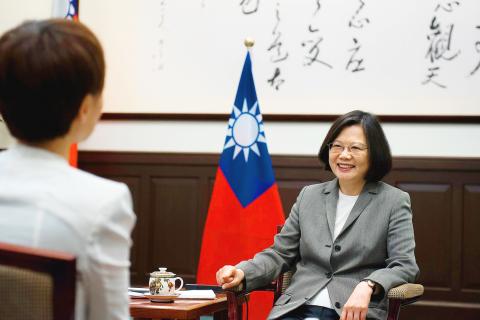Taiwan’s fears that it will become a bargaining chip between China and the US worsened on Friday after a snub by US President Donald Trump, who said he would not do anything to upset Beijing.
Trump rattled China in December last year after taking a congratulatory telephone call from President Tsai Ing-wen (蔡英文) after his election, smashing decades of diplomatic precedent.
However, after Tsai said in an interview with Reuters on Thursday in Taipei that her administration would not exclude the possibility of another telephone call with Trump, the US president said he did not want to risk his newfound “personal relationship” with Chinese President Xi Jinping (習近平).

Photo: EPA / Taiwan Presidential Office
“I think he’s doing an amazing job as a leader and I wouldn’t want to do anything that comes in the way of that. So I would certainly want to speak to him first,” Trump told Reuters in a separate interview.
Ties between Trump and Xi seem to have warmed recently after they met at Trump’s Mar-a-Lago estate in Florida earlier this month.
Since then, Trump has praised China for helping pressure North Korea over its nuclear and missile program.
Citing Tsai’s remarks, Presidential Office spokesman Alex Huang (黃重諺) on Friday said that it was “the president’s passive response to Reuters’ hypothetical questions.”
Tsai’s main point was to “stress that Taiwan and the US should maintain close communication and not rule out any possible form [of communication],” Huang said.
Chinese Nationalist Party (KMT) Legislator Chiang Wan-an (蔣萬安) called Trump’s reaction an “embarrassment” for Taiwan.
“Trump and Xi appear to have established very good relations. Taiwan needs to tread very carefully and be alert,” he told reporters.
The comments were a “serious slap in the face,” Tamkang University political analyst Edward Chen (陳一新) said. “Tsai is throwing the ball into Washington’s court and Washington is saying no.”
However, Democratic Progressive Party lawmaker Chao Tien-lin (趙天麟) said he thought Trump’s response was reasonable.
“Washington needs Beijing in handling the North Korea issue,” he said.
Concerns that Taiwan would become a bargaining chip were raised soon after Trump’s election, when he suggested he might abandon the “one China” policy that underpins US-China relations, unless he could strike better deals with Beijing.
He later went on to say he would honor the policy.
The US is Taiwan’s most powerful ally and arms supplier, despite having no official relations with Taipei after switching diplomatic recognition to Beijing in 1979.

The CIA has a message for Chinese government officials worried about their place in Chinese President Xi Jinping’s (習近平) government: Come work with us. The agency released two Mandarin-language videos on social media on Thursday inviting disgruntled officials to contact the CIA. The recruitment videos posted on YouTube and X racked up more than 5 million views combined in their first day. The outreach comes as CIA Director John Ratcliffe has vowed to boost the agency’s use of intelligence from human sources and its focus on China, which has recently targeted US officials with its own espionage operations. The videos are “aimed at

STEADFAST FRIEND: The bills encourage increased Taiwan-US engagement and address China’s distortion of UN Resolution 2758 to isolate Taiwan internationally The Presidential Office yesterday thanked the US House of Representatives for unanimously passing two Taiwan-related bills highlighting its solid support for Taiwan’s democracy and global participation, and for deepening bilateral relations. One of the bills, the Taiwan Assurance Implementation Act, requires the US Department of State to periodically review its guidelines for engagement with Taiwan, and report to the US Congress on the guidelines and plans to lift self-imposed limitations on US-Taiwan engagement. The other bill is the Taiwan International Solidarity Act, which clarifies that UN Resolution 2758 does not address the issue of the representation of Taiwan or its people in

US Indo-Pacific Commander Admiral Samuel Paparo on Friday expressed concern over the rate at which China is diversifying its military exercises, the Financial Times (FT) reported on Saturday. “The rates of change on the depth and breadth of their exercises is the one non-linear effect that I’ve seen in the last year that wakes me up at night or keeps me up at night,” Paparo was quoted by FT as saying while attending the annual Sedona Forum at the McCain Institute in Arizona. Paparo also expressed concern over the speed with which China was expanding its military. While the US

SHIFT: Taiwan’s better-than-expected first-quarter GDP and signs of weakness in the US have driven global capital back to emerging markets, the central bank head said The central bank yesterday blamed market speculation for the steep rise in the local currency, and urged exporters and financial institutions to stay calm and stop panic sell-offs to avoid hurting their own profitability. The nation’s top monetary policymaker said that it would step in, if necessary, to maintain order and stability in the foreign exchange market. The remarks came as the NT dollar yesterday closed up NT$0.919 to NT$30.145 against the US dollar in Taipei trading, after rising as high as NT$29.59 in intraday trading. The local currency has surged 5.85 percent against the greenback over the past two sessions, central